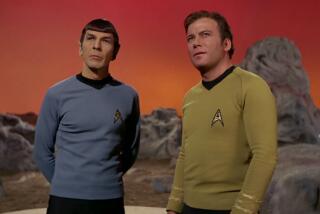TV WATCH : Logical Enterprise
- Share via
As the starship Enterprise’s science officer from the planet Vulcan, Mr. Spock, might have put it:
“Pure logic would dictate that a mere television show would not have the influence ‘Star Trek’ has had.”
But, as any earthling in Star Fleet would most likely reply, the phenomenal appeal of that old NBC series was based on more than logic and the intelligence of its science-fiction scripts. It was also based on hope.
In fact, the “Star Trek” saga’s creator, Gene Roddenberry--who died Thursday at 70--often said he believed his show’s staying power was based on its optimistic vision of a 23rd Century where people had learned to live in peace on Earth and were heading into outer space “to explore strange new worlds.”
Ironically, the original series was a flop, by Hollywood standards. It was canceled by NBC executives who found it “too cerebral” for television viewers.
Yet “Star Trek” had a fiercely loyal following of viewers who kept it alive long after NBC was swallowed up by a larger corporation. It has spawned books, five successful movies and a second TV series, “Star Trek: The Next Generation.”
So there is poetic justice in the fact that Roddenberry, who came up with the idea for “Star Trek” during a work life that included careers as a pilot, police officer and scriptwriter, lived long enough to see his creation celebrated as a cultural icon.
He will be missed, but his hopeful vision almost surely will live for many more new generations--maybe even to the 23rd Century.
More to Read
The complete guide to home viewing
Get Screen Gab for everything about the TV shows and streaming movies everyone’s talking about.
You may occasionally receive promotional content from the Los Angeles Times.






